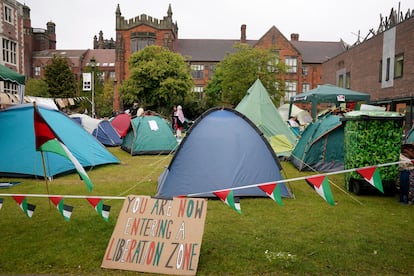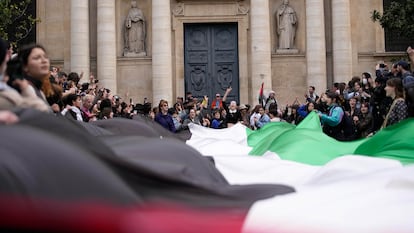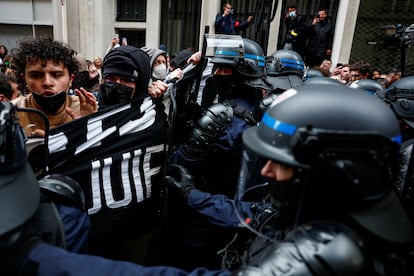What if pro-Palestinian protests cross the Atlantic? France and the UK fear contagion
The movement on campuses is currently very limited in Europe, where authorities are torn between showing firmness and allowing dialogue

What if the protests on American campuses extend to Europe? That scenario still seems far off. But in France and the United Kingdom, students have already begun to occupy campuses. And political and academic authorities fear contagion, although for now the movement, which also affects Italy, is limited.
French authorities, concerned about the impact on society of the Hamas attack on October 7 and the Israeli war in Gaza, have been displaying a mix of firmness and dialogue as they redouble their efforts to prevent the U.S. movement from taking hold in France. And the British government, which has maintained a belligerent attitude regarding the continuous pro-Palestinian demonstrations in recent months in the streets of London, has contacted university officials to demand that they be firm and nip in the bud any sign of what they view as antisemitism.
Although the protests have not fully caught on in Europe, in France the issue has ignited a partisan brawl between a radical left that waves the Palestinian flag and a right that calls for cutting off public funds if the demonstrations are not stopped immediately.

On Monday, during an attempted encampment at the Sorbonne that the police quickly cleared, Rima Hassan, a candidate for the European elections for the left-wing populist France Insoumise party (LFI), proclaimed on the social platform X: “The Sorbonne students mobilized to denounce the ongoing genocide in Gaza. It’s time for the uprising, let’s go support them!” That same day, the president of the Paris region, the conservative Valérie Pécresse, announced that she was suspending funding for another hub of protest, Sciences Po. Pécresse accused “a radicalized minority that calls for antisemitic hatred and is being exploited by LFI and its Islamo-leftist allies.”
In the United Kingdom, groups of students have begun improvising encampments since Wednesday in universities such as Manchester, Leeds, Bristol, Newcastle, Lancaster and Edinburgh. But the organization behind these protests is very weakly coordinated. As in France, the number of participants is not proportional to the magnitude of the American mobilizations and, so far, there have been no episodes of vandalism or confrontations with the police.
“We have always been clear that people have the right to protest in a peaceful and law-abiding way, but without abusing or intimidating other people,” explained a Downing Street spokesperson. “The police have the capacity and powers to stop disorders and protests, and they will have our full support.”
At the University of Manchester, more than 100 students gathered at the so-called Palestinian Resistance Camp, in Brunswick Park, to demand that the higher education center sever its ties with weapons companies such as BAE Systems and with Tel Aviv University.

Collaboration with Israel
In Italian cities including Turin, Pisa, Bologna and Rome, student groups have been demanding for weeks that universities end their collaboration with Israel, and on some campuses there have been clashes with the police. As a result of the protests in the United States, students from universities such as La Sapienza in Rome have announced mobilizations and occupations on May 7. In Spain, according to the Efe news agency, a university encampment in solidarity with Palestine that began on Monday at the School of Philosophy of the University of Valencia will continue indefinitely as long as they have “strength” in order to “achieve the end of the Palestinian genocide.” In France, besides Paris, there have been protests in Rennes, Toulouse, Strasbourg, Lyon and Grenoble, according to a count by Le Monde.
A common demand running through the protests is for universities to review or cancel their agreements with their Israeli counterparts. This was one of the topics on Thursday at a closed-door meeting between students and administrators of Sciences Po, a nursery for France’s political elites and an establishment of global influence. For two hours, some 320 people spoke about the war and its impact on the Parisian campus: the police occupation and eviction of a courtyard last week, the blocking of a street for one day, and finally the agreement to vacate the area.
“It has been a tough debate, with quite clear positions, a lot of emotion, and now I hope that everyone will find some calm,” said the center’s interim administrator, Jean Bassères, at the end of the meeting. Appearing alongside Bassères was the head of the School of International Affairs, Arancha González Laya, who declared: “Dialogue is not always comfortable, but in democracies nothing is comfortable, and we have prioritized the path of opening a dialogue.”
The protests could mark the campaign for the European elections in June: in France it is already happening. The radical left and the social democrats — the former openly pro-Palestinian and the latter seeking a balance — are fighting a battle that is projected on the campuses.
France is one of the Western countries with the largest Muslim and Jewish populations. And in intellectual and political debates there is a recurring fixation on the supposed Americanization of France: a reproduction there of the protests seen at Columbia and Los Angeles would be the definitive proof.
The French government wants to avoid it. Prime Minister Gabriel Attal has promised: “There will never be a right to blockade, nor any tolerance for the action of an agitating and dangerous minority that seeks to impose its rules on our students and our teachers.”
Sign up for our weekly newsletter to get more English-language news coverage from EL PAÍS USA Edition
Tu suscripción se está usando en otro dispositivo
¿Quieres añadir otro usuario a tu suscripción?
Si continúas leyendo en este dispositivo, no se podrá leer en el otro.
FlechaTu suscripción se está usando en otro dispositivo y solo puedes acceder a EL PAÍS desde un dispositivo a la vez.
Si quieres compartir tu cuenta, cambia tu suscripción a la modalidad Premium, así podrás añadir otro usuario. Cada uno accederá con su propia cuenta de email, lo que os permitirá personalizar vuestra experiencia en EL PAÍS.
¿Tienes una suscripción de empresa? Accede aquí para contratar más cuentas.
En el caso de no saber quién está usando tu cuenta, te recomendamos cambiar tu contraseña aquí.
Si decides continuar compartiendo tu cuenta, este mensaje se mostrará en tu dispositivo y en el de la otra persona que está usando tu cuenta de forma indefinida, afectando a tu experiencia de lectura. Puedes consultar aquí los términos y condiciones de la suscripción digital.








































